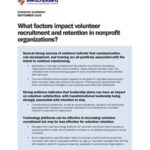Volunteerism plays a vital role in the extensive social service system. Previous research has shown that drivers of volunteering (DOVs) are associated with desirable outcomes such as improved volunteer performance and higher levels of volunteer engagement. However, limited attention has been paid to the differential effects of different DOVs on volunteer engagement and their mechanisms of influence. This study combines self-determination theory and conservation of resources theory to examine how external regulation and intrinsic motivation shape volunteer engagement through emotional labor strategies. Based on a three-wave time-lagged sampling of Chinese 952 volunteers, we find that external regulation reduces volunteer hours and increases volunteering turnover via surface acting; intrinsic motivation increases volunteer hours and reduces volunteering turnover via deep acting. This study may suggest a preliminary insight into the mediating effect of emotions between DOVs and volunteer
A Systematic Review on the Impact of Trauma-Informed Education Programs on Academic and Academic-Related Functioning for Students Who Have Experienced Childhood Adversity
The purpose of this study was to conduct a systematic review of the existing literature regarding trauma-informed education programs and their impact on academic and academic-related outcomes. The articles included for review (n=15) contained data on trauma-informed education programs implemented in preschool, primary/elementary, and high school settings. Academic and academic-related outcomes reported included attendance, disciplinary…

